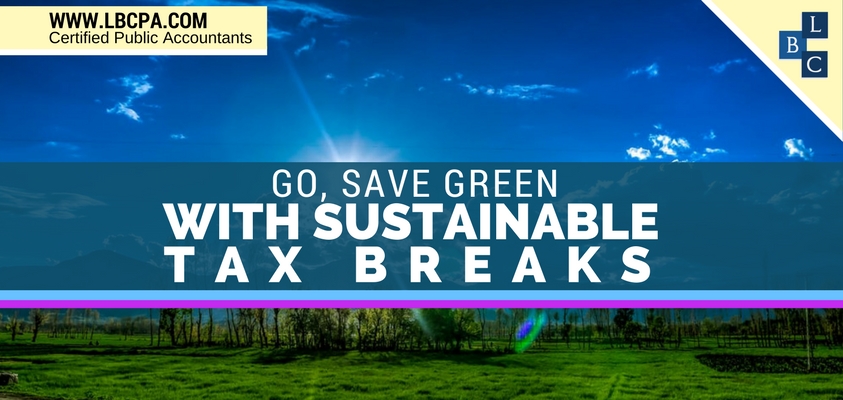LBCPA News 
Click here to go back
GO, SAVE GREEN WITH SUSTAINABLE TAX BREAKS

Many people want to do something, however small, to contribute to a healthier environment. There are many ways to do so and, for some of them, you can even save a few tax dollars for your efforts.
Indeed, with the passage of the Protecting Americans from Tax Hikes Act of 2015 (the PATH Act) late last year, a couple of specific ways to go green and claim a tax break have been made permanent or extended. Let’s take a closer look at each.
Not driving for dollars
Air pollution is a problem in many areas of the country. Among the biggest contributors are vehicle emissions. So it follows that cutting down on the number of vehicles on the road can, in turn, diminish air pollution.
To help accomplish this, many people choose to commute to work via van pools or using public transportation. And, helpfully, the PATH Act is doing its part as well. The law made permanent the requirement that limits on the amounts that can be excluded from an employee’s wages for income and payroll tax purposes be the same for both parking benefits and van pooling / mass transit benefits.
Before the PATH Act’s parity provision, the monthly limit for 2015 was only $130 for van pooling / mass transit benefits. But, because of the new law, the 2015 monthly limit for these benefits was boosted to the $250 parking benefit limit and the 2016 limit is $255.
Sprucing up the homestead
Energy consumption can also have a negative impact on the environment and use up limited natural resources. Many homeowners want to reduce their energy consumption for environmental reasons or simply to cut their utility bills.
The PATH Act lends a helping hand here, too, by extending through 2016 the credit for purchases of residential energy property. This includes items such as:
New high-efficiency heating and air conditioning systems,
Qualifying forms of insulation,
Energy-efficient exterior windows and doors, and
High-efficiency water heaters and stoves that burn biomass fuel.
The provision allows a credit of 10% of eligible costs for energy-efficient insulation, windows and doors. A credit is also available for 100% of eligible costs for energy-efficient heating and cooling equipment and water heaters, up to a lifetime limit of $500 (with no more than $200 from windows and skylights).
Doing it all
Going green and saving some green on your tax bill? Yes, you can do both. Van pooling or taking public transportation and improving your home’s energy efficiency are two prime examples. Please contact us for more information about how to claim these tax breaks or identify other ways to save this year.
If you have any questions regarding accounting, domestic taxation, international taxation, IRS representation, U.S. tax implications of Real Estate transactions or financial statements, please give us a call at 305-274-5811.






